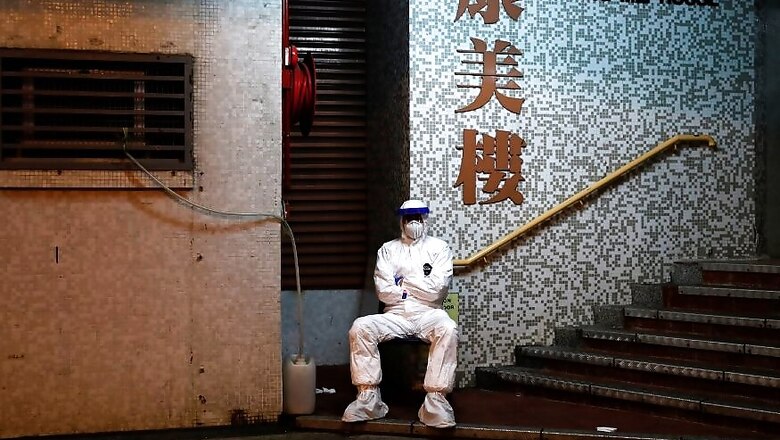
views
New York: In Arizona, a burgeoning Asian American community fields xenophobic calls about a planned night market featuring Asian street foods. In New York, a dim sum restaurant owner worries he won't make rent. In the San Francisco Bay Area, a local Asian American-owned restaurant chain is mulling temporarily shuttering one of its properties because of the downturn in trade.
In major US cities, Asian American businesses are seeing a remarkable decline in customers as fear about the viral outbreak from China spreads. City and health officials are trying to staunch the financial bleeding through information campaigns and personal visits to shops and restaurants, emphasizing that, with just 15 cases diagnosed in the entire country, there is no reason to avoid them.
Business owners, some of whom have seen their customer traffic cut by more than half, are anxiously waiting for things to return to normal.
Mesa, Arizona's freshly crowned Asian District was deep into organizing its night market when news broke that a case of the illness known as COVID-19 was confirmed at nearby Arizona State University.
Xenophobic comments on social media and phone calls started almost immediately, according to Arizona Asian Chamber of Commerce CEO Vicente Reid.
“I probably should stop picking up my phone altogether," Reid said. "One lady was like, 'Well, aren't people coming to your event that are the cause of it?'" The Feb. 29 food festival, modeled after popular outdoor Taiwanese markets, was designed to get the public acquainted with the district.
Mesa Mayor John Giles called the xenophobia directed at the event ridiculous. We certainly take any health crisis seriously but to make those kinds of connections is just offensive," he said.
Organisers will be handing out specially made masks with playful Asian-food theme slogans like Bao to me and Insert lumpia here. The virus has sickened tens of thousands of people, mostly in China.
Fifteen people have been diagnosed with the virus in the U.S., all but two who recently traveled from China. U.S. citizens have also been diagnosed abroad, including 14 who were on a cruise ship quarantined off Japan and have been brought to hospitals in the U.S.
Vegetarian Dim Sum House has been a fixture in Manhattan's Chinatown for 23 years, but suddenly owner Frankie Chu said he will not be able to make his rent this month.
Chu said sales have plunged 70% over the last two weeks at his no-frills restaurant. Three couples trickled in for lunch on a recent weekday. Normally, Chu said he gets up to 30 customers for lunch. At dinnertime, his narrow restaurant is usually packed with about 70 diners. These days, he gets about four.
Chu has sent some of his staff on vacation to cut costs. Under the circumstances, he will ask his landlord to forgive a 5% late fee normally charged.
“I don't know how long I can stay here, Chu said. After 9/11, it wasn't this bad. The crisis has alarmed New York City officials and business leaders, who have launched a campaign to lure people back to hard-hit communities in Manhattan, Queens and Brooklyn.”
Chinatown is bleeding, said Wellington Chen, executive chairman of the Chinatown Partnership, a local business and community group. This thing is thousands of miles away. This fear is really out of proportion. Small businesses in Manhattan's Chinatown have reported sales drops of between 40% and 80% the past month as the viral outbreak in China spread, Chen said. In Flushing, business is down an estimated 40%, according to the Flushing Chinese Business Association.
For some businesses, it's much higher. Derek Law, senior vice chairman of the America China Hotel Association, said business has dropped about 70% at a spa he owns in Flushing. New York City is home to more than half a million Chinese Americans, the biggest population of any U.S. city. Some New Yorkers of Chinese descent are frustrated at being made to feel like foreigners because of a disease outbreak that feels as far away to them as any other resident.
“I'm probably more American than a lot of the people asking me about coronavirus. It's a little annoying to be honest,” said Christina Seid, owner of the Chinatown Ice Cream Factory, a neighborhood fixture that her father founded four decades ago with flavor offerings like mango and green tea.
Seid, whose great-grandparents immigrated to New York from China, said business has been slower than usual but added that the winter months are never good for ice cream shops. She said she feels optimistic that things will soon return to normal, relying on New Yorkers' determination to get on with life.
With no confirmed cases of the virus in New York City, officials and politicians are trying to drive home the point that there is no reason to avoid any neighborhood, with many eating at Chinese restaurants and tweeting out photos under the hashtags #supportchinatown.













Comments
0 comment